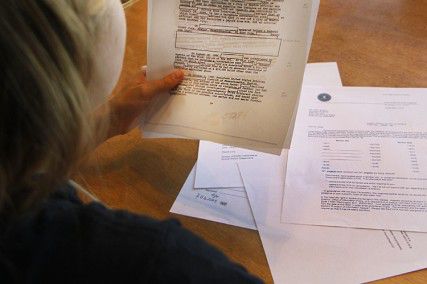
In order to provide more access to information for the public, Massachusetts lawmakers revisited a law on Tuesday to give access to state records in a simplified and affordable way.
Proponents of the change say there are many problems with the public records law, including delayed response times for agencies at the state level and fee structures that are no longer relevant to record-keeping in 2013.
Mass. Rep. Antonio Cabral said public records laws have not been updated or reformed in several decades, and that legislation in the books on how to maintain public records and grant access to records resembles 19th-century legal structures.
“Right now, it’s quite difficult to navigate, [or] to try to get information that ought to be public information,” he said. “Depending on the agency, the department, you might come to different ways of ways of access and different costs of records, so there’s not one clear way of trying to access depending on what you want, on which department it is and which agency it might be.”
The Massachusetts Legislature website was given a failing grade for being one of the least transparent government websites, The Daily Free Press previously reported on March 20. They were given an “F” for not posting roll call votes online, having numerous online bugs and a broken website much of the time, and for not retaining records before 2009.
Shawn Musgrave, projects editor at MuckRock, a public records service and media site dedicated to government transparency, said he supports lawmakers looking to update these regulations on public records.
“This bill requires agencies to take the disclosure requirements into consideration as they’re designing their databases to make it easier to export data,” he said. “This will bring down costs, as well as relieving a lot of burden from the records officers for having to do these things that in 2013 no one should have to do, and it also makes it really east to submit a records request.”
Kenneth Bunting, executive director at the National Freedom of Information Coalition, said the legislation reinstates the government’s duty to the public.
“It makes the government more accountable to the extent that it makes acts of the government information that is easier to get to and less costly,” he said. “That’s a good thing for the people of Massachusetts. Basically the main thing that would make it better for the public is if people in government realize that it’s a duty, and one that they should welcome and embrace, to make government information available to the public.”
Cabral said he did not see any disadvantages to the bill.
“If you support transparency … you should believe that governments should be open, should be transparent, which I believe they should,” he said. “I think that the better informed the public, the better democracy we have. So if you believe in those principals, then there are no disadvantages on these bills.”
Musgrave said this law would have a huge impact on the residents of Boston.
“It affects an everyday person in terms of being able to know either through the media or direct inquiry from a private citizen how government is working, what decisions are being made on taxpayer money and in the name of the electorate,” he said.
Some residents said they want to have more access to public records.
“I believe the people should have more access to the government,” said Jackie Marshall, 22, resident of Boston. “I don’t personally deal with public record all that much, but if it makes it easier to get them … it’s a good thing.”
Audrey McArthur, 26, resident of Boston, said there should still be a fee for access.
“Obviously if someone has to process records, there needs to be a fee, just because the money has to come from somewhere,” she said. “It’s good to have transparency, and helping it be more transparent or accessible is good.”
Lisa Romeo, 47, resident of Brighton, said there should not be a fee since the money used for public records is already coming from taxes.
“It’s time and money spent by a state employee to get the documents, which is my tax money, so it doesn’t seem unreasonable to me to keep the fee as it is,” she said. “As far as making the process easier or faster … I can understand that, but I’m not sure if it will make a difference.”






















































































































